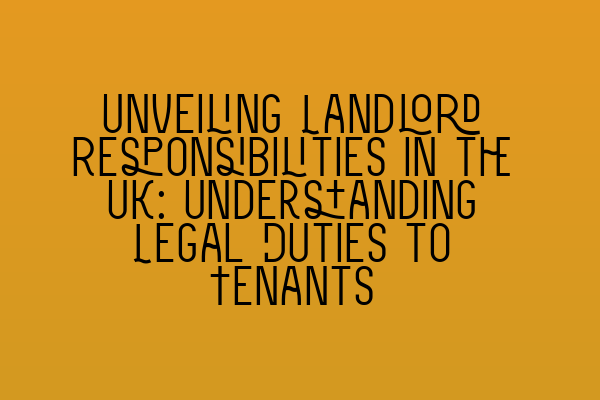Unveiling Landlord Responsibilities in the UK: Understanding Legal Duties to Tenants
Welcome to SQE Property Law & Land Law, where we provide expert advice and guidance on all aspects of property law in the UK. In today’s blog post, we will be delving into the essential topic of landlord responsibilities and their legal duties to tenants. Whether you are a tenant seeking clarity on your rights or a landlord looking to fulfill your obligations, this comprehensive guide will break down the key responsibilities that every landlord must adhere to.
Before we dive into the nitty-gritty details, let’s take a moment to understand why a thorough understanding of landlord responsibilities is crucial. As a tenant, knowing your rights not only ensures your well-being and protection but also empowers you to address any potential issues that may arise during your tenancy. For landlords, being aware of your legal duties not only preserves the reputation of your property but also prevents costly legal disputes.
So, let’s explore the main responsibilities that landlords must fulfill:
1. Maintaining the Property
One of the fundamental obligations of a landlord is to ensure that the property is safe, habitable, and well-maintained. This includes addressing any structural issues, repairing faulty systems (such as plumbing or heating), and keeping common areas clean and functional. It is essential that the property meets the required health and safety standards, providing a suitable living environment for tenants.
If you are a tenant and believe that your landlord is neglecting their responsibility to maintain the property, it’s important to know that you have legal recourse. You can seek remedies such as repairs, compensation, or even terminate the tenancy agreement if the conditions become uninhabitable.
2. Ensuring Compliance with Health and Safety Regulations
Apart from general maintenance, landlords are required to comply with health and safety regulations. This includes ensuring that the property has adequate fire safety measures, such as smoke detectors, fire extinguishers, and escape routes. Landlords must also conduct gas and electrical safety checks at regular intervals and provide valid certificates to tenants.
If you suspect that your landlord is not fulfilling their legal duties regarding health and safety, it is essential to take action to protect yourself and fellow tenants. You have the right to report any concerns to the local council or relevant regulatory authorities.
3. Managing Tenancy Deposits
When renting a property in the UK, landlords are required to protect tenants’ deposits in a government-approved tenancy deposit scheme. This ensures that tenants’ deposits are safeguarded and can be returned to them at the end of the tenancy, minus any lawful deductions for damages or unpaid rent. Landlords must provide tenants with prescribed information about the scheme in which their deposit is protected within a specific timeframe.
If you are a tenant, it’s vital to be aware of the tenancy deposit scheme in which your deposit is protected and to ensure that you receive the necessary information from your landlord. Failure to comply with deposit protection regulations can result in penalties for landlords.
4. Providing Tenant Privacy
Landlords must respect tenants’ right to privacy and adhere to the guidelines regarding entering the property. Unless it is an emergency or there is a valid reason, landlords should provide reasonable notice to tenants before entering the premises. This allows tenants to enjoy quiet and peaceful enjoyment of their rented property.
If you believe that your landlord is repeatedly violating your privacy rights, it is advisable to communicate your concerns with them in writing, keeping a record of all correspondence. If the issue persists, seeking legal advice or approaching a relevant third party, such as a housing ombudsman, may be necessary.
5. Complying with Anti-Discrimination Laws
Landlords have a legal duty to ensure that they do not discriminate against tenants based on protected characteristics such as race, religion, gender, sexual orientation, or disability. They must comply with anti-discrimination laws and ensure fair treatment of all tenants during the application process, the tenancy, and any subsequent interactions.
If you believe that you have been discriminated against by your landlord, it is important to gather evidence of the discriminatory behavior and seek legal advice or report the incident to the appropriate authorities.
Understanding and asserting your rights as a tenant or fulfilling your obligations as a landlord can be complex. However, by familiarizing yourself with the legal responsibilities outlined above, you are one step closer to ensuring a fair and harmonious tenancy experience.
For further guidance on property and land law matters, feel free to explore our website for related articles and resources:
- SQE Contract Law: Analyzing Landmark Cases and Influential Judicial Decisions
- Understanding Contractual Capacity: Rights and Limitations
- Interactive SQE Mock Tests for Contract Law: Test Your Knowledge
- Join Our SQE Contract Law Webinars: Expert Insights and Guidance
- SQE Prep: Mastering the Essentials of Contract Law
At SQE Property Law & Land Law, we are committed to providing reliable and comprehensive legal advice. We have a team of experienced solicitors who specialize in property and land law, ready to assist you with any legal concerns you may have. Contact us today for expert guidance tailored to your specific needs.
